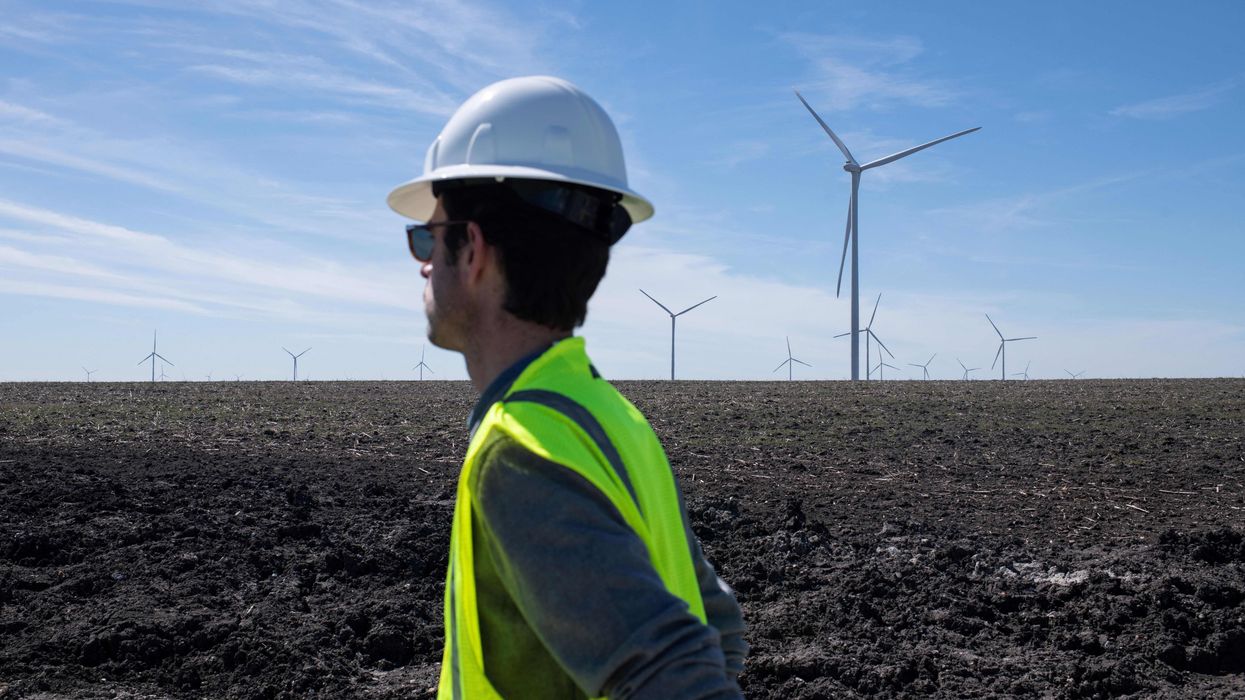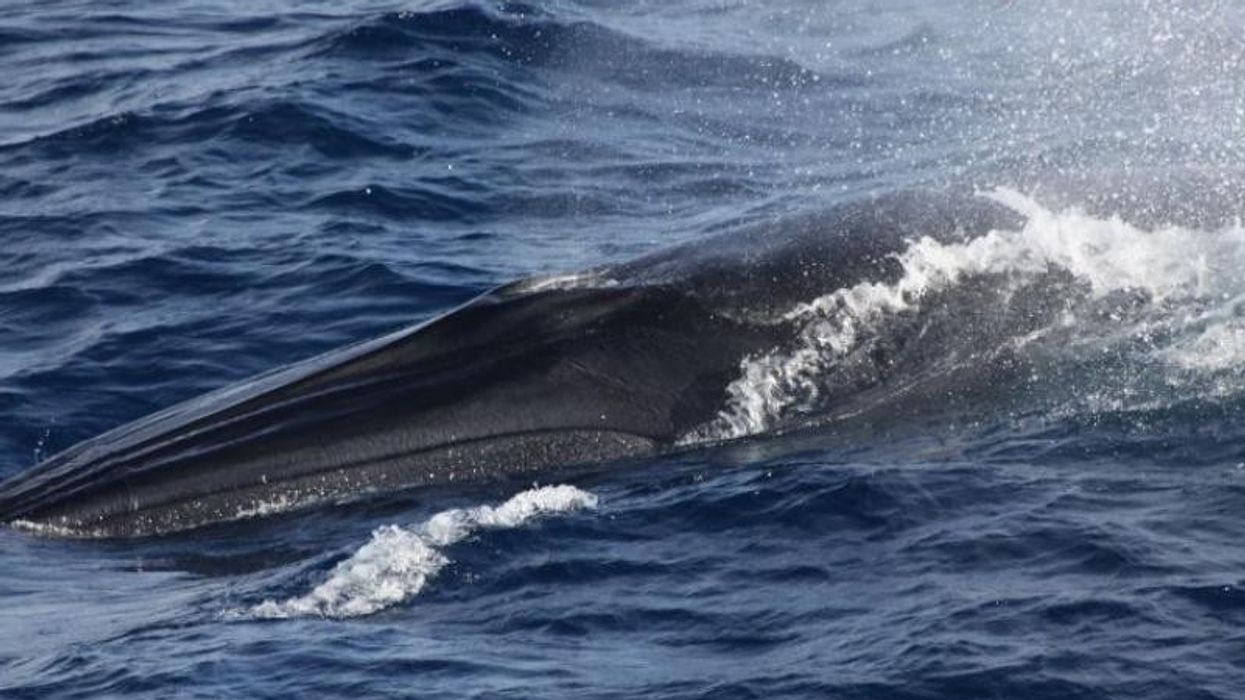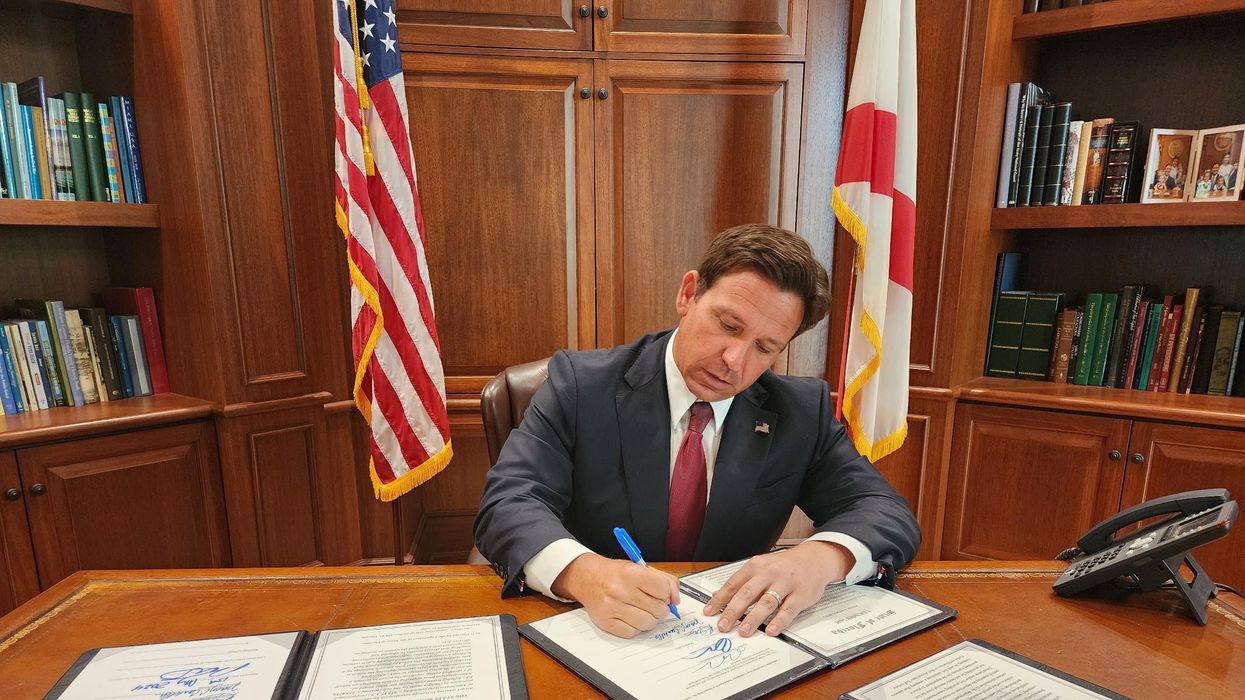What a GOP Government Will Really Mean for the Renewable Energy Rollout
If the next Trump administration is serious about pulling the plug on clean energy, that will add up to a lot of jobs and investments to undo in states and districts where the president-elect handily won the election.
For all that U.S. President-elect Donald Trump trashed renewable energy on the stump, much of his ranting may very well become a murmur when he returns to the Oval Office.
Obscured by his “green new scam” rhetoric is a mad scramble by his supporters in Congress to reap the economic benefits of green industry for their states and districts. The increasing investments, precisely in the places that voted for him, make President-elect Trump’s pledge to “terminate” many green programs political wolf talk. That is because the renewable energy industry is growing jobs more than twice as fast as the overall economy.
This acknowledgement from conservative lawmakers that clean energy and electric vehicles are good business makes it reasonable to bet that the investments they’ve secured for their districts will survive the president-elect’s rhetoric of a “green new scam.”
A lasting irony of the outgoing Biden administration will be how no Republican in Congress voted for the 2022 Inflation Reduction Act (IRA). Yet 85% of the announced clean energy projects and 68% of the jobs triggered by the IRA, such as those related to electric vehicles, wind power, solar power, and battery storage, have gone to Republican-held congressional districts, according to E2, a nonpartisan group that monitors the clean energy industry.
The representatives of those districts see no apparent contradiction in touting the attractiveness of their areas for clean energy investments, while publicly supporting the president-elect’s rhetoric and proposals to end clean energy programs.
Love-Hate Relationships Abound
For instance, Texas Congressmember Jodey Arrington, who represents a House district that includes Lubbock and Abilene, called the IRA a “failed liberal spending spree that crippled our economy and left working American families worse off.” The Washington Post reported in October that Arrington’s district is the nation’s fifth-highest recipient of investments for clean energy and manufacturing, receiving nearly $5 billion.
Then there is Tennessee Senator Marsha Blackburn: a climate skeptic who says infrastructure projects that fight climate change are a “gateway to socialism.” She told the Republican National Convention this summer that the “green new scam” was “destroying small businesses.”
Huh? Relative to the size of the state’s economy (as measured by gross domestic product), Tennessee ranks first in the nation in clean technology manufacturing investment from the IRA, according to the Clean Investment Monitor, maintained by the Massachusetts Institute of Technology’s Center for Energy and Environmental Policy Research and the Rhodium Group.
Senator Blackburn seems well aware of it. Even before the IRA, when vehicle maker Ford cut the ribbon on a $5.6 billion electric battery plant in her state in 2021, she boasted how Tennessee is “leading the way for innovation” with a “historic project” that would directly create 5,800 jobs and create “countless opportunities in supporting industries.”
The champion of hypocrisy is Representative Richard Hudson, congressman for North Carolina’s Ninth District, nestled in the center of the state. In voting against the IRA, he blasted clean energy programs as “woke climate and social programs that won’t work.”
Hudson was wide awake for the money coming to his district to expand a massive Toyota battery plant for electric vehicles and hybrids. According to E2, Hudson’s district is top in the nation both for clean energy investment and for clean energy job growth triggered by the IRA. The Toyota plant alone promises more than 5,000 jobs. Estimates of investment in his district range from nearly $10 billion to nearly $13 billion.
Selective Cuts Desired
If the next Trump administration is serious about pulling the plug on clean energy, that will add up to a lot of jobs and investments to undo in states and districts where the president-elect handily won the election. North Carolina Representative Hudson hinted he agrees. When CNN asked him in June if he would vote to repeal the IRA if the Republicans won control of the federal government in the election—which they did—he responded, “Rather than try to repeal one big bill with another big bill, we ought to look at the individual policies.”
Another sign that Republicans ultimately won’t scrap all the benefits of the Inflation Reduction Act came in an August letter by 18 Republicans to House Speaker Mike Johnson (R-La.). The lawmakers asked Johnson to preserve clean energy tax credits in any effort to repeal or reform the IRA. The letter acknowledged that energy tax credits “have spurred innovation, incentivized investment, and created good jobs in many parts of the country—including many districts represented by members of our conference.”
The letter warned that repealing energy tax credits, especially those for projects that have already broken ground “would undermine private investments and stop development that is already ongoing.”
This acknowledgement from conservative lawmakers that clean energy and electric vehicles are good business makes it reasonable to bet that the investments they’ve secured for their districts will survive the president-elect’s rhetoric of a “green new scam.”
Risks to Offshore Wind Loom
Much less clear is the near-term future for offshore wind.
While campaigning, President-elect Trump promised to sign an executive order on the first day of his return to bring a halt to the offshore wind industry. Never mind that onshore wind is booming in red states in the windy, rural middle of the United States, providing 130,000 jobs. The fastest growing occupation in the nation is wind turbine service technician, paying an average of nearly $62,000 a year according to the Bureau of Labor Statistics (BLS).
According to the Energy Information Agency, the top four states for electricity generation from wind in 2023 were the red states of Texas, Iowa, Oklahoma, and Kansas.
In even more serious doubt is a just transition, where communities that suffer the most from fossil fuel production and pollution can get jobs, lower energy costs, and cleaner air from a move to renewables.
The offshore wind industry, a staple of energy generation in northern Europe, is still in its infancy in the United States. It remains highly vulnerable to price shocks, supply-chain issues, local opposition to siting, and being a political dartboard. The industry is currently centered in more liberal Northeastern states thanks to ideal water depths off the Atlantic coastline and forward-looking governors from Massachusetts to Virginia who have been competing the last two decades for ports and projects.
The U.S. has the technical capacity to harness three times more electricity from offshore wind than it currently uses today, with the Atlantic Ocean off the Northeast coast possessing some of the strongest wind speeds in the country.
Surprisingly, despite its “Drill, Baby, Drill” mantra for oil, the first Trump administration promoted offshore wind when it found out how much money the leases could put into federal coffers. It conducted a then-record auction for waters off Massachusetts to site off-shore wind projects. Ports and manufacturing facilities as far south as Louisiana, home state of House Speaker Mike Johnson, helped launch the nation’s first offshore wind farm in Rhode Island.
But that has not stopped oil and gas companies from continuing to conduct disinformation campaigns to stir up opposition to offshore wind. It is clear they have a lot to lose from a full-blown offshore wind industry in the Northeast. For example, gas accounts for at least half of the electricity generation in New England and New Jersey. New York City generates between 85% and 90% of its electricity from fossil fuels. The Northeast Gas Association boasts that about half the entire region gets its electricity from gas.
On the campaign trail, President-elect Trump elected to play off that disinformation. He attacked offshore wind with gale force lies about its impact on whales and the environment, claims which have zero science behind them as NOAA and others explain.
The unending verbal assault makes it reasonable to worry that under this second administration President-elect Trump may truly try to score political points by directing the Bureau of Ocean Energy Management to slow permitting of new projects and telling the Justice Department to side with opponents of incomplete projects. Many experts say that just the slowing of the permitting process risks making construction more expensive and may scare off investors.
Then There’s the Issue of Equity
In even more serious doubt is a just transition, where communities that suffer the most from fossil fuel production and pollution can get jobs, lower energy costs, and cleaner air from a move to renewables.
Almost by definition, the growth of clean energy industries in more sparsely populated, majority white, Republican-held districts may exacerbate the existing structural racism in the energy sector’s workforce, which has been a driver of the Biden administration’s goal of directing 40% of federal climate and clean energy investments to disadvantaged communities.
For instance, Black people are 13% of the nation’s workforce and account for only 8% of the solar and wind workforce, according to the Department of Energy. The Interstate Renewable Energy Council (IREC) says the percentage of Black solar workers has not budged since 2022. Yet, the second-fastest growing job in the nation, according to the Bureau of Labor Statistics, are solar panel installers, making on average $48,000 a year.
The percentage of people of color in leadership positions in the renewable energy supply chain is currently infinitesimally small. A 2022 report by the American Council on Renewable Energy found that of 658 manufacturers involved in utility-scale wind, solar, and battery storage, 1.8% were owned by people of color or women. And while there is one bright spot in diversity, with 33% of new clean energy jobs last year being filled by Latinos, 88% of solar industry executives are white and 80% are male, according to the IREC.
Only a quarter of solar firms in the IREC’s annual National Solar Jobs Census reported that they had strategies to hire more people of color or women.
With the return of President-elect Trump, accompanied now by Vice President-elect JD Vance, it will take maverick clean energy companies to improve diversity. Just this past June, Vance co-introduced (along with Senator Blackburn) a bill in the Senate to eliminate all federal diversity, equity, and inclusion (DEI) programs and funding for any entities that receive federal funding. Representatives Arrington and Hudson co-sponsored the measure in the House. Cynically twisting the purpose of DEI to ensure fair opportunities for people from historically excluded groups, Vice President-elect Vance claims DEI “breeds hatred and racial division.”
President-elect Trump himself has already begun to nominate members of his cabinet with direct ties to Project 2025, the de facto Republican Party platform that also calls for the elimination of DEI throughout government. Project 2025 explicitly calls for the end of DEI in the Energy Department and eliminating the Office of Environmental Justice and External Civil Rights in the Environmental Protection Agency.
The pall placed over the nation is already being felt even before Inauguration Day, as Walmart recently announced it was rolling back DEI policies or dismantling DEI teams, joining companies like Ford, Boeing, Toyota, Lowe’s, Harley Davidson, Molson Coors, John Deere, and Tractor Supply. That follows the scores of universities that are eliminating DEI in the wake of the Supreme Court’s 2023 striking down of affirmative action. It was a ruling virtually assured by President Trump’s packing of the court in his first term.
In a blog last year on this flood of renewable money flowing into Republican districts from a Democratic-inspired law, I wrote that the nation would be so much stronger in the fight against climate change and the effort to clean up communities and boost the economy if conservatives would “drop the two-faced charade of climate denial while diving unabashedly into the pot of federal renewable incentives and tax breaks.” Now that the forces of climate denial have regained the White House and control of both chambers of Congress, they don’t even need two faces. They can just be bald-faced aggrandizers.
The renewable energy industry will indeed have a strong expansion in the U.S. It’s just that it will be heavily driven by a real green scam—an expansion being led by politicians who harness and hoard solar power, wind power, and electric vehicles for their own constituents, but deny it for everyone else.


